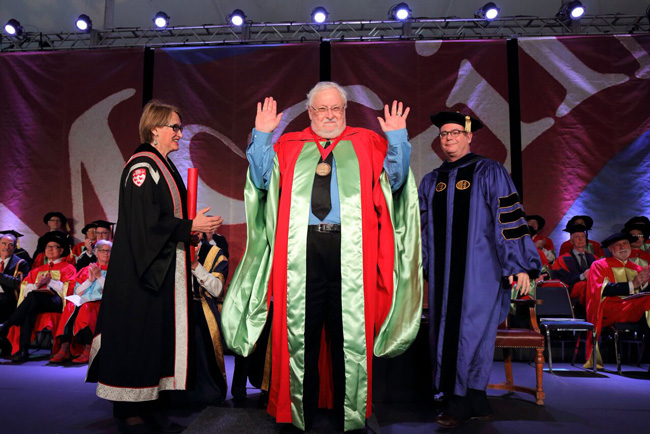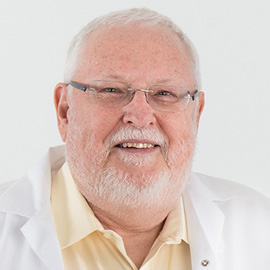
By Neale McDevitt
Established in 2009, the McGill University Medal for Exceptional Academic Achievement is awarded to retired members of McGill’s academic staff who are uniquely deserving in light of their exceptional contributions to their discipline, to the University and to society at large. One of the University’s highest honours, the McGill Medal has only been awarded to five people – Aberto J. Aguayo, Adi Eisenberg and Lawrence Mysak in 2010; Margaret Lock in 2012; and Roderick Macdonald in 2014).
As part of Spring 2016 Convocation, three McGill icons gained admittance to this exclusive club; Donald Taylor, John Bergeron and Philip Branton, featured below)
Philip Branton knows a lot about cancer. Branton, the Gilman Cheney Professor at the Department of Oncology and Biochemistry is an internationally renowned virologist with over 40 years of cancer research experience, focusing largely on the human adenovirus, which has been used as an experimental system to uncover basic mechanisms of oncogenesis, tumour suppressors, and regulation of cell proliferation and cell death. But, if Branton has learned anything over the course of his long, distinguished career it is that “there is still so much we just don’t understand about cancer.”

Branton has served as the Scientific Director of the Institute of Cancer Research (ICR), a division of the Canadian Institutes of Health Research (CIHR); and in various capacities with the National Cancer Institute of Canada, the Medical Research Council, and the Canadian Breast Cancer Research Initiative. He was also instrumental in the establishment of the Canadian Cancer Research Alliance, an organization that fosters the development of partnerships among cancer research funders and promotes the development of national research priorities.
“In many ways cancer was where the action was in cell and molecular biology back in the days when I was doing my PhD,” says Branton. “It was the most challenging and complex problem that human beings were facing – and probably still is. But it required a lot of basic research and understanding basic principles. As a researcher it presented me with an endless series of fascinating questions.”
Early in his career, the sky seemed to be the limit for Branton and his colleagues. Many in the scientific community believed they were on the verge of a major breakthrough in cancer research. “In the early 70s, with [the work being done with] oncogenes and tumour suppressors, I really thought that with a little more work we were going to figure it out,” he says. “But we came to understand that cancer is incredibly complex and cancer cells are able to adapt and mutate in seemingly infinite ways.
“We know a lot about the mechanisms of cancer cell creation and the biochemistry of the pathways involved. And we are very clever at developing ways to interrupt those pathways to stop the cancer,” Branton continues. “The problem is that cancer cells develop resistance to these drugs. So even if drugs are successful initially, very often altered cells are able to survive and the cancer comes back.”
In spite of “phenomenal” drugs currently under development or already on the market, the challenge is ongoing. Branton believes that the newest, brightest hope in cancer treatment may lie in immunotherapy – a type of treatment that boosts the body’s natural defenses to fight the cancer.
While Branton is optimistic about the efficacy of immunotherapy, he warns that “we’re not there yet,” estimating another decade of basic research is needed before successful therapies will emerge.
The fly in the ointment, he says, is that there is less and less emphasis being put on basic research. “These days, there is much more support for translational research – research that can be converted into treatments and can be applied directly in the clinic.
Branton says he doesn’t want to downplay the importance of translational research (“I championed increased funding for translational research when I was Scientific Director of the ICR”) but he believes there should be a better balance.
“At present, it is very hard to get money for discovery research, and this concerns me because the one lesson we have learned through all the years is that we don’t know enough,” says Branton. “We need new information – information that comes from discovery research – because our chances of translating successfully are diminished if we don’t have a constant new supply of information.”
Recent years have not been good for research, says Branton. “Stephen Harper was not very generous to science. His government put money into infrastructure and career awards so they could argue that they did support science but the fact is money to actually do research was incredibly limited during his time in office. We’re still feeling the impact to the extent that I’m worried we will lose a generation of researchers,” he says. “But I am hopeful that we will see the situation improve under Justin Trudeau.”
When asked about winning the McGill Medal, Branton chuckles. “I didn’t even know I was being nominated for this,” he says. “I guess I’m an old guy who has been around for a long time and who has had some success.
“I’m so happy I came to McGill [in 1990 as Chair of the Biochemistry Department],” says Branton. “The quality of the students, post docs and faculty members was just incredible – as was the collegial atmosphere of the Department. Everyone cooperated towards moving the Department – and the work we did – along. I was incredibly lucky.”
Read the feature on John Bergeron, one of this year’s winners of the McGill Medal.
Read the feature on Donald Taylor, one of this year’s winners of the McGill Medal.
